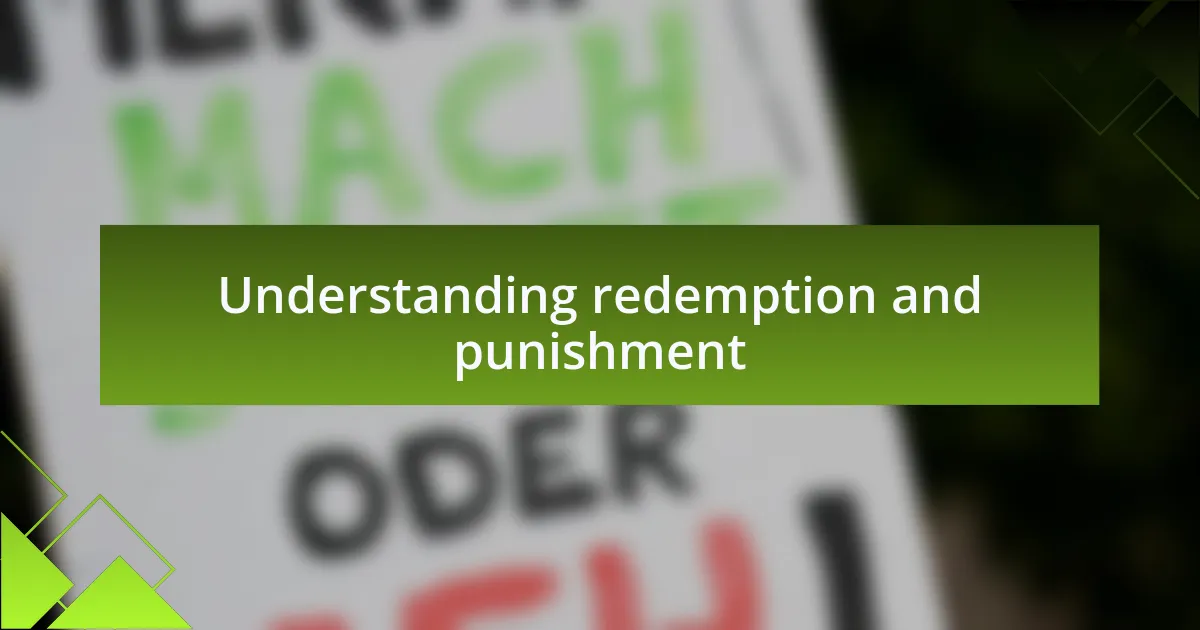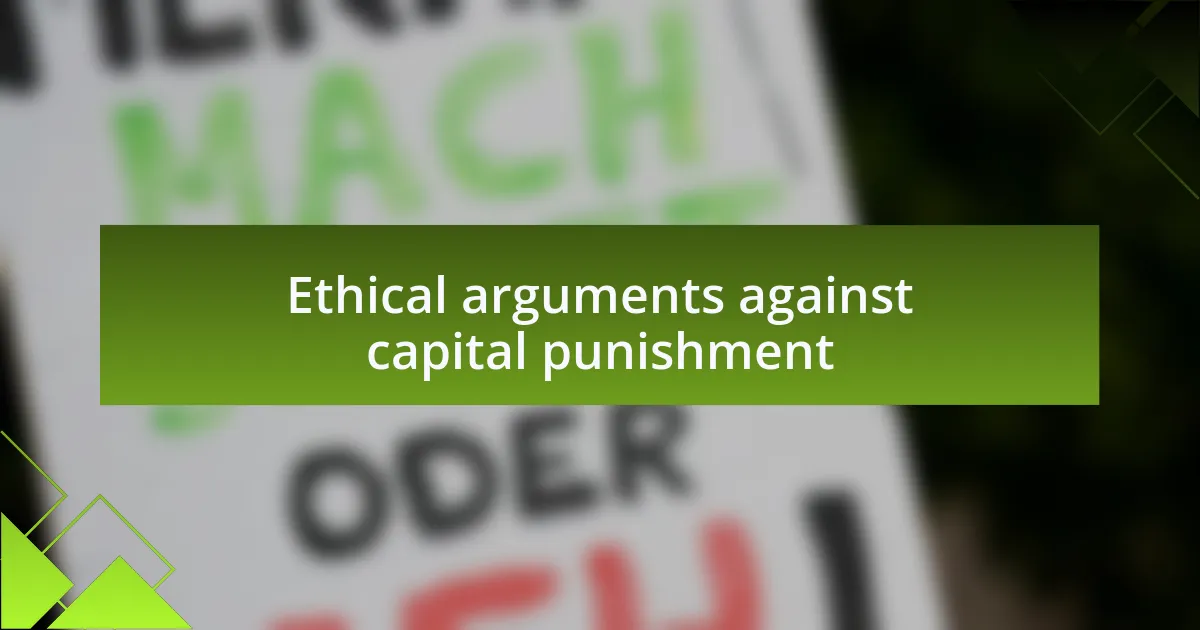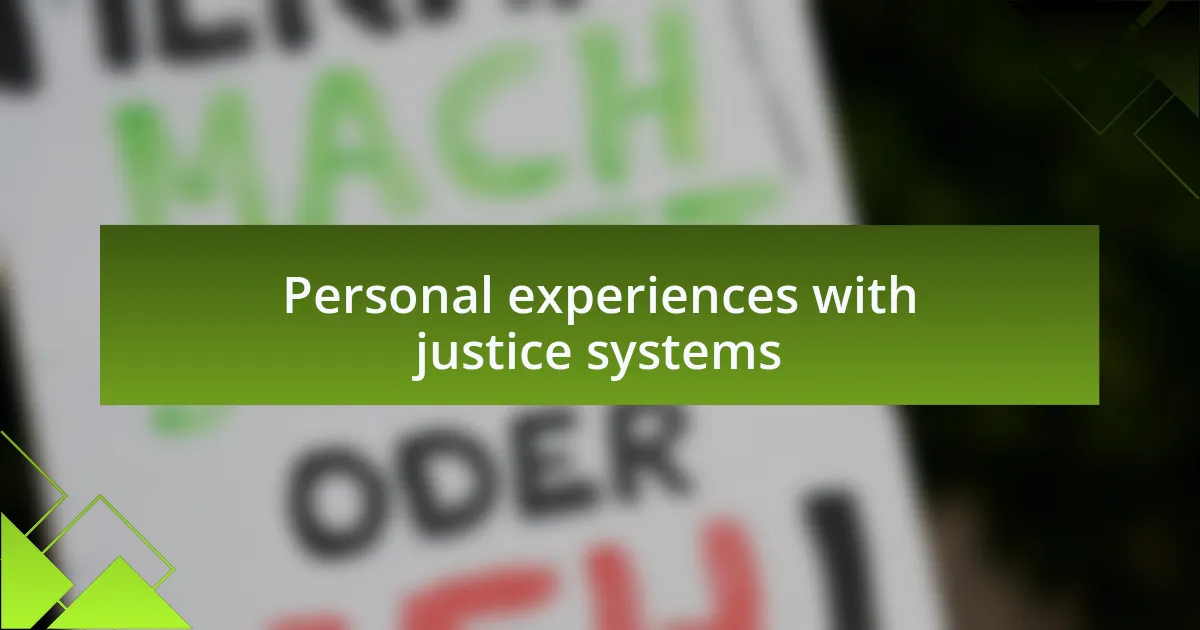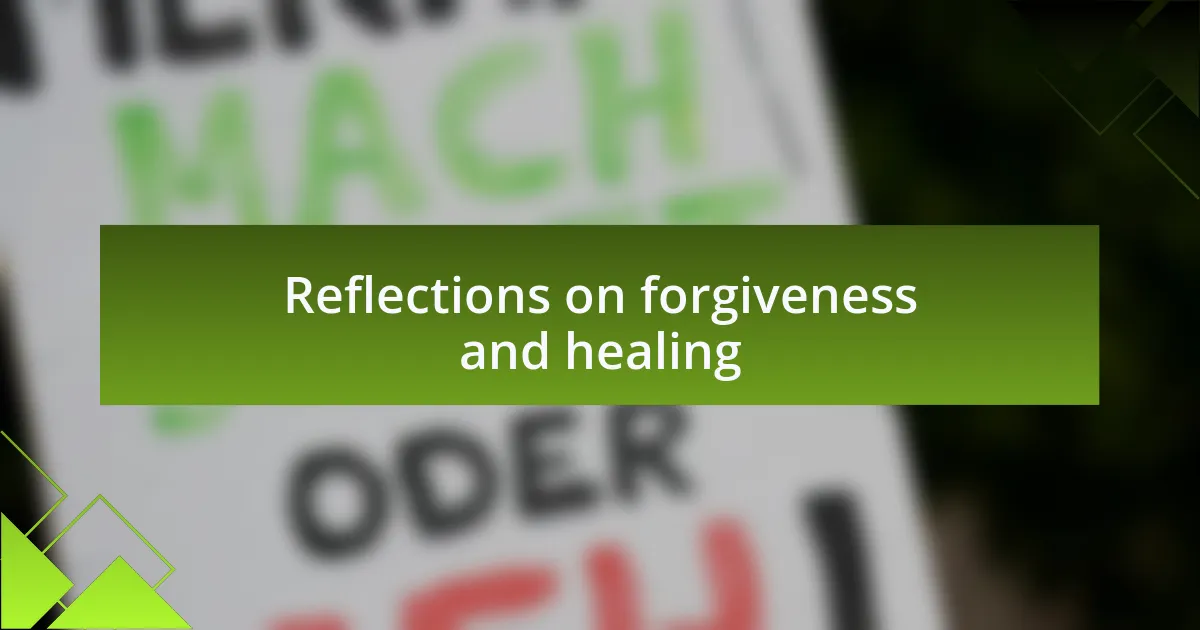Key takeaways:
- Redemption can emerge from punishment, suggesting that punitive experiences may catalyze personal transformation and societal contribution.
- The anti-death penalty movement emphasizes the fragility of justice systems, advocating for systemic reform to address disparities and promote rehabilitation.
- Ethical dilemmas surrounding capital punishment highlight the irreversible nature of mistakes in the justice system and the contradiction in valuing human life.
- Forgiveness and healing are interconnected processes that can lead to personal transformation, emphasizing compassion for oneself and others in the journey toward recovery.

Understanding redemption and punishment
Redemption and punishment are often seen as opposing forces, yet they can coexist in a complex relationship. I remember a conversation I had with a former inmate who spoke about his journey toward redemption after serving time for a serious crime. He shared how the strict punishment he faced led him to reflect deeply on his actions and ultimately strive to become a better person. This raises the question: Can punishment serve as a catalyst for genuine change?
When contemplating the role of punishment, I often ask myself how it influences not just the individual, but society as a whole. For instance, take the story of a young man who, after being released from prison, took it upon himself to mentor at-risk youth. His punishment led him to a path of redemption, demonstrating that even those who have erred can contribute positively. This duality—where punishment can be a precursor to redemption—invites us to reevaluate our perspectives on justice.
We frequently hear discussions about whether punishment can truly rehabilitate. In my view, punishment alone may not foster redemption; instead, it is the support systems in place afterward that play a crucial role. A close friend of mine once said, “It’s not just about paying your dues; it’s about finding your purpose.” So, how do we create environments that encourage individuals to seek redemption? This question is essential in our conversations about justice and the future of our penal systems.

Exploring the anti-death penalty movement
The anti-death penalty movement has grown increasingly significant as it challenges the notion that capital punishment serves as an effective deterrent. I remember attending a rally where a survivor of violent crime spoke passionately about her belief in restorative justice over retribution. Her words struck me deeply: “Why should we seek to take life in response to taking life?” This perspective reinforces the idea that compassion can be a stronger force for healing than vengeance.
As I delve into the movement’s history, I often reflect on the countless stories of individuals spared from execution who went on to advocate for change. One powerful example is that of a man who spent years on death row before being exonerated through DNA evidence. Hearing him recount his experience of wrongful punishment reminded me how fragile our justice system can be and how vital it is to question the morality of taking someone’s life. It raises an important question: Can we morally justify a system that risks executing the innocent?
Moreover, the movement emphasizes the need for systemic reform in addressing issues like racial and economic disparities in capital sentencing. I’ve engaged in discussions with activists who passionately argue that the lives of marginalized individuals are disproportionately at stake. This keeps me questioning: How can we work together to create a justice system that emphasizes rehabilitation and equality, rather than a cycle of punishment that only perpetuates injustice?

Ethical arguments against capital punishment
The ethical arguments against capital punishment often center on the intrinsic value of human life. In my view, once we accept the state-sanctioned taking of life, we tread a dangerously slippery slope. I still vividly recall a conversation with a friend who said, “How can we claim to value life if we are willing to take it away?” This question resonates deeply and highlights how capital punishment can be viewed as a fundamental contradiction in our commitment to human rights.
Furthermore, the irreversible nature of the death penalty raises significant moral dilemmas. I often find myself reflecting on stories of wrongfully convicted individuals exonerated long after their lives were nearly destroyed. One particular documentary I watched featured a man released after spending over 20 years in prison for a crime he didn’t commit. How do we justify a system that can make such catastrophic mistakes? This illustrates the profound ethical issue of executing the innocent, begging for a reevaluation of our justice system’s approach.
Additionally, I believe that capital punishment fosters a culture of vengeance rather than healing. Engaging with those invested in restorative justice has shifted my perspective. During a workshop, a facilitator posed the question, “What if we focused on accountability instead of retribution?” This thought-provoking moment sparked a realization: choosing compassion over punishment could pave the way for a more just and ethical society, ultimately honoring the dignity of every individual involved.

Personal experiences with justice systems
Reflecting on my interactions with the justice system, I have often been struck by its complexities. I remember sitting in a courtroom, feeling the palpable tension as a family learned of their loved one’s sentencing. It was a profound reminder that justice is not just an abstract concept—it has real-world implications that deeply affect people’s lives and futures.
In another instance, I volunteered at a local legal aid clinic and witnessed firsthand the struggles faced by those navigating the system. A young father shared how he felt like a pawn, trapped between a system that seemed more interested in punishment than rehabilitation. This sparked a question in my mind: what does it truly mean to achieve justice if we continue to marginalize those already vulnerable?
I often ponder the stories of individuals who have emerged from incarceration yearning for a second chance. There was a woman I met who, despite her past, fought fiercely for her own redemption. Listening to her talk about the barriers she faced made me realize that the justice system must evolve to support healing rather than just enforcing punishment. How can we call ourselves a just society if we do not provide pathways for transformation?

Reflections on forgiveness and healing
Reflections on forgiveness and healing
Forgiveness is a powerful concept that often feels out of reach, especially in the wake of pain and loss. I once attended a restorative justice session where a victim met with their offender. The air was thick with emotion, but what struck me most was the moment both parties broke down, sharing their stories and realizing their shared humanity. Can healing truly begin without this essential moment of connection and understanding?
I remember discussing forgiveness with a friend who had lost a sibling to violence. Despite her heartbreak, she spoke of her journey towards healing, indicating that holding onto anger only perpetuated her pain. Isn’t it fascinating how forgiveness can serve as a pathway to reclaiming one’s life, transforming suffering into strength? This conversation illuminated the importance of nurturing compassion, not only for others but for ourselves, as part of the healing journey.
In my own path toward understanding forgiveness, I’ve learned that it doesn’t erase the past but rather reframes it. A family member once opened up about their struggles with anger after experiencing betrayal. They expressed how, through years of reflection, they found a way to let go of resentment, allowing space for healing to flourish. Isn’t it profound how sometimes, it is in our willingness to forgive that we find the freedom to move forward?